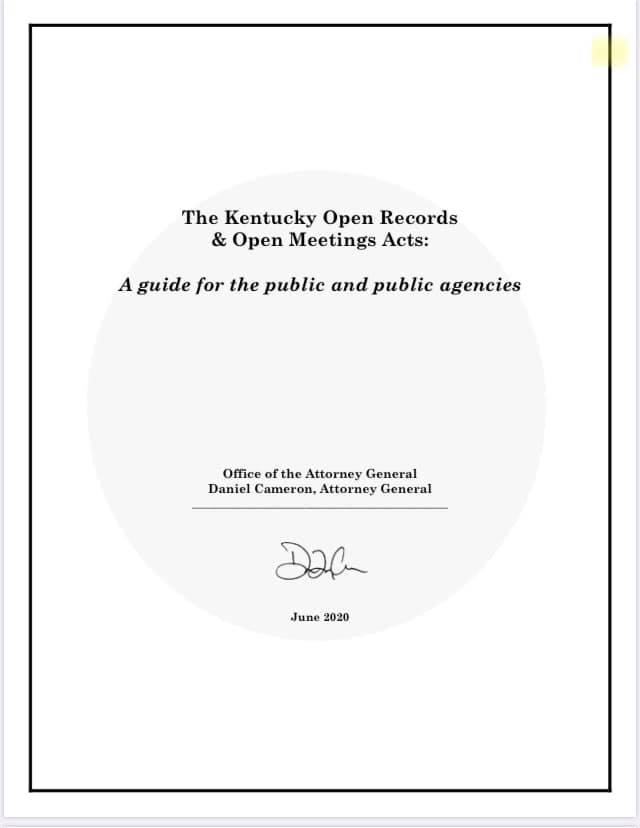
With little to no fanfare, on June 29 the Office of the Kentucky Attorney General revised and republished an open records and open meetings guidebook that pre-dates 1991.
https://ag.ky.gov/AG%20Publications/20.06.29%20Open%20Records%20Open%20…
The OAG did so as required by KRS 15.257.
https://apps.legislature.ky.gov/law/statutes/statute.aspx?id=915
That 2005 statute directs the attorney general to distribute to named officials written information that explains the laws within 90 days of the date on which amendments to the open records and meetings laws become effective.
It's as close to a general "educational requirement" for public officials as our law comes.
This year's changes to the laws are found in SB 150, the Coronavirus Relief Act, and do not permanently "amend" either law. Signed into law on March 30, they are temporary modifications that will lapse when the state of emergency is lifted.
https://apps.legislature.ky.gov/record/20RS/sb150.html
A section of the new publication addresses these temporary changes.
Formerly two publications — a citizen's guide entitled "Protecting Your Right to Know" and a public official's guide entitled "Your Duty Under the Law" — Attorney General Daniel Cameron has combined them into one guide aimed at both citizens and officials.
https://ag.ky.gov/AG%20Publications/Your-Duty-Under-the-Law.pdf
https://ag.ky.gov/AG%20Publications/Protecting-Your-Right-to-Know.pdf
It is entitled "A Guide for the Public and Public Agencies."
Acknowledging my investment in these publications — which I assisted in authoring and/or revising over the years — I do not necessarily view this as a positive change.
Duties should be plainly spelled out to public officials. Rights should be plainly spelled out to the public. Commingling rights and duties is not entirely conducive to clarity.
That said, it does not appear that General Cameron is otherwise attempting to distance himself from his predecessors in office.
The tone is more formal than previous editions, but substantively there are only minor changes to the combined publication. Most are superficial: title (of course), cover design, typeface, and several Daniel Cameron mentions, including an introductory letter from the attorney general himself.
No such letter appeared in prior editions, and the public and public agencies were frankly none the worse for it.
The publication Is now 35 pages long, exceeding those issued by Cameron's predecessors by 11 pages. That is partially attributable to the statement of the temporary changes resulting from SB 150.
Given his staff's apparent belief that the less said the better, this is surprising. Under the Andy Beshear administration, open records and meetings decisions — ORDs and OMDs — averaged from five to ten pages.
The average decision's length in this administration is two to three pages.
(A side note: Much is lost in the decision to prioritize brevity over thoroughness. Although the decisions resolve the legal question presented by the parties, they are of little use as precedent for non-parties [including agencies, attorneys, the media, the public, and even the courts]. Short on facts, legal analysis, and citation to prior open records or meetings decisions, they are the legal equivalent of an "inside joke" between the attorney general and the parties.)
There are, otherwise, few changes.
One change does, however, stand out. Cameron's staff has chosen to blur the line between statute and judicial and administrative interpretation of statute by removing italics — intended to distinguish statute from interpretation — that appeared in past editions.
In drafting "Protecting Your Right to Know" and "Your Duty under the Law," we believed there was value in pointing out how the courts and past attorneys general interpreted the law. This, we hoped, would enable the reader to avoid falling into the same legal traps.
But because we believed it appropriate to distinguish statutes from interpretation of statutes, we offered this disclaimer, "Please note that the italicized and bulleted text reflects the courts' and the Attorney General's interpretation of the Acts."
This language has been eliminated in the revised publication, and the italics removed, arguably making it more difficult to distinguish between statutes and interpretation of statutes — a distinction with a marked difference.
Those of us who came before Daniel Cameron are pleased that he otherwise made few changes to the publications and that he has made clear his intent to adhere to carefully considered and solid legal precedent established during his predecessors' administrations.
It remains to be seen whether his decision to combine the publications into one will ultimately better serve the public — for whose benefit the open records and open meetings laws were ultimately enacted.


